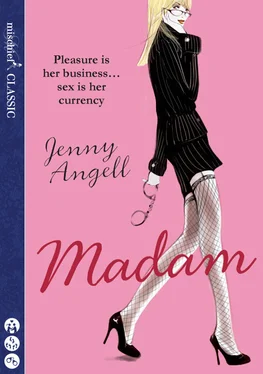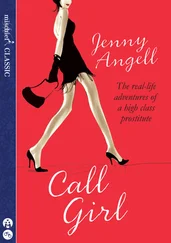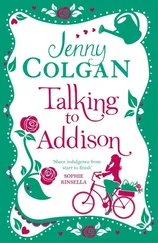This showed up in the way she worked, too. She was extremely stupendously generous to her girls, giving them gifts at unexpected moments, singling one or another out and taking her on a surprise shopping spree. Once, she took eight of the girls on a trip to Alaska all expenses paid. It was work, of course, a road show of sorts, but they made absolutely fantastic money and got to travel on top of it.
But she demanded – required – fanatical loyalty. You didn’t work for anybody else while you were working for Laura. Period. She’d cut you off; there were no second chances. And she would invariably find out, because everybody knows everybody else in Boston. A client would usually tip her off – most of the clients were hooked into more than one service. If they called another agency and got someone they’d already met through Laura, they told her. And that was that.
It was as if Laura had this little circle of nuns around her, going off to do their assigned tasks (in this case, fucking men for money) and then returning docilely to the convent under their madam mother superior’s sphere of influence. She didn’t like any of them – including me – having friendships outside of the house. She sure as hell didn’t like any of us having boyfriends outside of the house.
These rules, such as they were, were never articulated, but we all understood them, and we all used them against each other.
I’ve never ever seen such a bunch of gossips as I saw in that house – and where I come from, gossiping is an art form. These girls were impressive . Well, it was only natural that we would gossip: there we all were, stuck in this nouveau-riche house in the back of beyond in suburbia, hanging out together all day with very little to do. No wonder all we talked about was laundry and each other. We probably sounded like junior high kids whispering and giggling by their lockers in a school corridor.
I take that back. We were worse than junior high kids. At least they have the excuse of age, inexperience, and innocence. None of us had any of that going for us.
We were all in our twenties, everyone (except me) dressed in lingerie of some kind, made up, nails lacquered, sitting around on the plastic-covered furniture, waiting. We’d keep the soaps on all day, until a client pulled up outside; then the TV had to be turned off. Major rule, that.
A guy would come in, and everyone would suddenly try to look like it’s a normal thing, all these girls sitting around in their lace and satin and high heels, each one of them competing with the next for his attention.
If that doesn’t make you want to do drugs, I don’t know what would.
If the guy had an appointment with someone, then that was different. Everyone would smile sweetly and the girl would take him off to one of the bedrooms. We’d switch the television back on as soon as we heard the door shut. These were the days before the Internet: we couldn’t just look up what we’d missed on the soaps, so clients were a major interruption.
When we weren’t watching TV, we were talking about anything and everything, but mostly about each other – and Laura. Lord, we gossiped about Laura, and we were vicious – who she was seeing (Laura was always seeing someone), how much coke she’d done the night before, and what she’d said somebody had said about somebody else. I remember, years later, seeing a high school rendition of The Music Man , and being absolutely amazed at how well Rogers and Hammerstein had described our activity.
Of course, the first thing that everyone wanted to do was find Laura and report back to her on who had said what.
In some ways, I guess, I do see some of Laura in myself. We can both be incredibly generous and incredibly selfish. We both have a lot of issues that we deal with by not dealing with them. We both talk – a lot, probably too much. We both manage to survive.
But her style never was my style, and when I left her house and got myself my dream apartment in Boston’s Bay Village, I knew that I had learned enough to know what I didn’t want.
That was a damned good start.
* * * * * *
At that time, the Boston Phoenix had a pullout adult section called “After Dark.” It still has this section, actually, but these days it’s been renamed and redesigned, which I find unfortunate. I’d always liked that name, thought it was pretty classy. Sort of belied the interior. There wasn’t much that you couldn’t find there.
I had a friend once, Claudia, who moved up to the Boston area from New York or New Jersey, someplace where they must be more sophisticated than she – apparently – was. It was late at night. She was tired, overshot the city, and ended up going north on Route 1. Exhausted, she saw a motel, pulled over and went to check in, figuring that she’d find her way to wherever it was that she was supposed to be going in the morning. The name of the motel was the Sir John. (Okay, I know, I know, so she was really tired.) The manager was a little surprised that she wanted the room for the whole night, but I guess he figured, what the hell. She didn’t notice that the motel was right next door to the Golden Banana, one of the North Shore’s biggest and most famous strip clubs. She sure as hell didn’t get much sleep that night.
Anyway, Claudia told me once – years later – that while she was sleepily driving back south on Route 1 into the city the next morning, she was looking around her, and figured that there wasn’t anything that anybody could possibly want in terms of commodities that they couldn’t buy on Route One.
That was how I felt about the After Dark supplement in the Phoenix . There wasn’t anything that you could possibly want that you couldn’t find there.
I thought that After Dark was as wicked as it got.
* * * * * *
My innocence was in part the product of my personality and in part the product of my past. I really do believe at some level that people are fundamentally good and that, given the opportunity, they do the right thing. My observation of and occasional participation in thoughts and actions that are less than pure haven’t completely tarnished this fundamental belief.
My experience – well, that’s something else altogether. If I went by my experience, I’d probably be as cynical as they come.
I grew up in the South, where ladies are ladies, “sir” and “ma’am” are common, and when people ask you how you are, they wait for an answer. That’s a far cry from the brisk how-ya-doin’? of the Northeast. I really do believe that there’s a little of Scarlett O’Hara in every white woman who grew up in the South, a fundamental belief that good manners can get you through just about any situation. For a very long time, I expected people to behave well – just because they should.
That was not exactly the best upbringing for my line of work, but I’ve also found that it tempers the cynicism that is part and parcel of my profession and makes me – or so I’m told – reasonably pleasant to work with. Perhaps not the most overwhelming of compliments, but there are days when I’m willing to settle for reasonably pleasant.
It also means that I smile and acknowledge toll collectors as people, am overwhelmingly polite to telephone operators, and am, of course, kind to dogs and small children. Or is that children and small dogs? I never seem to get that one quite right.
In any case, what the South did give me, besides that take on life and an accent I still cannot entirely get rid of, was a wealth of literature. I love to read; I read everything that is ever been set in front of me, from cereal boxes to VCR instructions, but the voices of the South are what echo the loudest in my world, then and now.
Читать дальше












